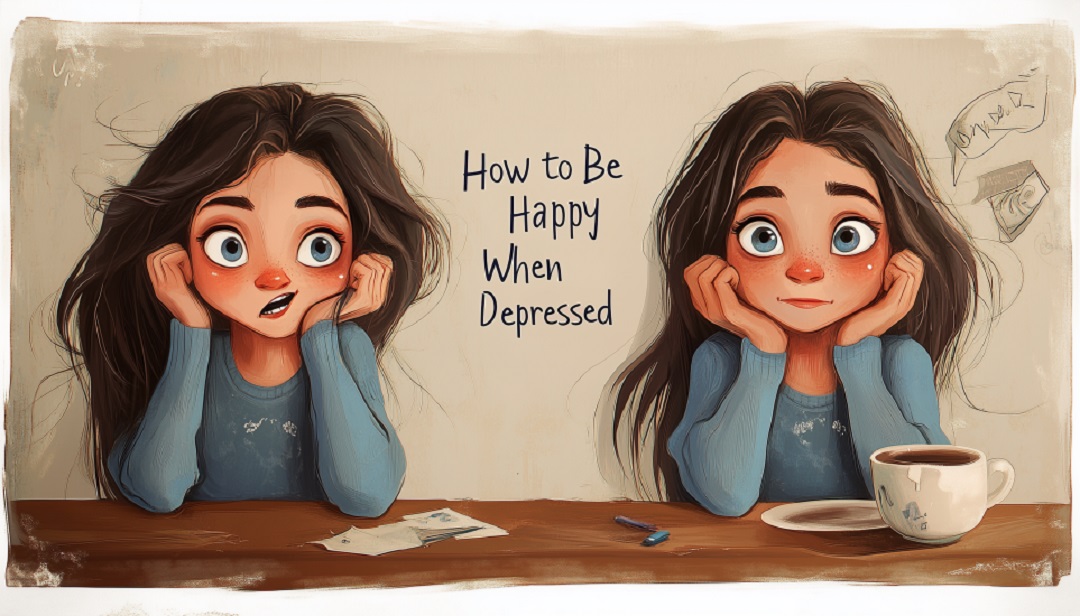How to Be Happy When Depressed: 13 Practical Tips to Find Light in the Midst of the Storm
Depression can feel like an endless storm, but even in the darkest skies, you can take small steps toward the light. By acknowledging your feelings, shifting your mindset, and making intentional choices—no matter how small—you can create space for moments of joy and healing. The first step? Learning how to begin.


Back
8 mins read
Let’s start with the obvious, being told to “just be happy” when you're battling depression feels like being handed a paper umbrella in a torrential downpour. It’s not that simple, and frankly, it’s kind of frustrating because depression can weigh you down like an overstuffed backpack you didn’t ask to carry. It feels like your mood and energy levels are stuck in a gray, rainy loop.
But if you’re reading this, you’re likely searching for something more substantial than cliché platitudes like ways to feel happy, even when depression is doing its best to steal your joy.
That’s brave. And, that’s a tall order.
After all, depression isn’t just a bad day or fleeting sadness. It’s a complex mental health condition that affects approximately 21 million adults globally each year, with conditions like major depressive disorder (MDD) or persistent depressive disorder (PDD) being among the most common, according to the National Institute of Mental Health (NIMH).
Yet, even in the midst of depression, finding happiness—even a sliver of it—isn't impossible. It might take effort, a pinch of patience, and, yes, a few small changes, but it's within your reach.
This article will walk you through practical strategies to help you find those moments and nurture them, even when it feels like everything else is falling apart.
The Science Behind the Difficulty of Finding Happiness When Depressed

Depression makes everyday life feel like a marathon without a finish line. It affects people in profound ways—negative thinking, low self-esteem, physical and mental health problems, trouble sleeping, and even weight gain. These symptoms of depression often reinforce each other, creating a cycle that feels impossible to break.
A study published by Harvard Health Publishing notes that depression alters brain chemistry, particularly in areas that control mood, decision-making, and positive reinforcement. This explains why even things you once loved—like spending time with friends or watching a funny movie—might feel hollow now. Depression affects the brain’s reward system, making it harder to experience joy.
So, if you’re battling severe feelings of sadness or numbness, know it’s not just in your mind—it affects your brain, body, and entire being. However, you can hack this system to gradually boost your mood.
13 Ways to Find Happiness When Depression is Loud

Here are some tips for finding happiness when you feel stuck in a gray rainy loop.
1. Acknowledge Your Feelings Without Judgement
Before you can even think about happiness, it’s crucial to recognize depression for what it is—a mental illness, not a character flaw. So, instead of berating yourself for not being happy, permit yourself to feel what you’re feeling. After all, acknowledging your emotions is the first step toward understanding them.
For those experiencing smiling depression—where you appear outwardly happy but struggle internally—this step is even more important. Recognizing the disconnect between how you feel and how you present yourself to the world allows you to start addressing the root of your emotions and work toward genuine happiness.
2. Get Moving (Even if It’s Just a Little)
We get it: when depression makes you feel irritable and exhausted, exercise might sound like a cruel joke. But here’s the irony of it—research suggests physical activity is one of the most science-supported ways to relieve symptoms of depression.
For instance, regular physical activity, especially aerobic exercises like walking or dancing, boosts your mood by increasing endorphins, the body’s natural mood enhancers. It also helps manage stress by reducing cortisol, the hormone responsible for stress.
Exercise also promotes better sleep, which can address one of the most common symptoms of depression. Together, these benefits make movement an effective way to make you feel happy when depressed. If the idea of exercise feels overwhelming, start with deep breathing exercises or stretches. Baby steps are still steps forward.
3. Celebrate Small Wins (Because They Add Up)
When depression clouds your ability to see the big picture, focusing on small, positive changes can feel monumental. Did you manage to get out of bed today? Celebrate that. Did you enjoy a sip of coffee or tea? That’s a win. Cook yourself a meal? That’s self-care in action.
These moments may seem insignificant, but they build momentum over time. Recognize and find joy in the tiny things, and eventually, the bigger picture will become clearer.
4. Nourish Your Body and Mind
The connection between physical and mental health is undeniable. Depression affects not just your mind but your entire body, and the reverse is also true—what you put into your body can impact your mental state.
Thus, you can boost happiness by building a healthy lifestyle through simple, mindful habits. Start by eating mindfully and replacing junk food with nutrient-dense options like whole grains, lean protein, and leafy greens. Staying hydrated is also essential, as dehydration can worsen symptoms like fatigue and difficulty concentrating. Lastly, take small, manageable steps instead of making drastic changes overnight. Begin by adding one healthy snack or meal at a time to make the transition smoother and more sustainable.
As the old saying goes, “You are what you eat.” So, why not aim to feel like a vibrant smoothie instead of a sad doughnut?
5. Prioritize Restful Sleep
Sleep problems, like trouble falling asleep or staying asleep, are some of the depression symptoms. Unfortunately, lack of sleep can worsen mood changes, create negative thoughts, drain energy levels, and affect overall well-being.
To improve your sleep schedule, avoid screens for at least an hour before bedtime. Create a calming pre-sleep routine, such as practicing deep breathing or reading a book, to help your mind and body relax. And also try to stick to consistent sleep and wake times, even on weekends, to maintain a healthy rhythm.
If sleep problems persist, consider consulting a healthcare provider for additional support.
6. Don’t Go It Alone: Lean on Others
One of depression’s sneakiest tricks is making you withdraw from people who care about you. But connection—whether through a family member, friend, or support group—can provide a much-needed lifeline. Simply talking about how you feel with them without the fear of judgment can lighten the emotional load.
If opening up feels intimidating, consider writing your feelings down first or starting small by texting someone you trust.
7. Engage in Activities That Spark Joy (Even If They’re Tiny)
When depression saps your energy, even the thought of doing something fun can feel exhausting. But tiny moments of joy can act as little sparks in the darkness, helping to lift your mood without requiring Herculean effort. It doesn’t have to be big or ambitious. Maybe it’s something as simple as listening to your favorite nostalgic song, doodling on a piece of paper, or watching a funny video online
The key is to remind yourself that even small activities can bring a glimmer of light. You don’t need to feel “up for it” to start; sometimes, the act of doing creates its own momentum. Pick something that feels manageable and comforting, even if it’s just a couple of minutes spent sipping tea on your balcony or flipping through an old photo album. These tiny moments add up and can make a big difference over time.
8. Challenge Negative Thoughts
Negative thinking is a common symptom of depression, and it can feel like an uninvited guest who never leaves. To combat this, try reframing those thoughts to positive ones. For example, if you think, “I’m useless,” counter it with, “I’m struggling right now, but that doesn’t define my worth.”
Cognitive-behavioral therapy (CBT) is particularly effective at helping people recognize and challenge these patterns. If you can, working with a mental health professional can provide invaluable guidance.
Related: Self-Talk Tips to Chase Away the Blues—Talk Your Way to More Happiness!
9. Manage Stress Levels with Mindfulness
Major life changes and stressful events can often trigger depression, creating a vicious cycle. Mindfulness exercises, like deep breathing or progressive muscle relaxation, can help you regain control when stress levels spike.
Start with simple breathing exercises: inhale for four counts, hold for four counts, and exhale for six counts. It’s not about achieving instant Zen—it’s about calming your nervous system in the moment.
10. Be Kind to Yourself
Remember this: you are not your depression. You’re a person experiencing depression, and that’s an important distinction. Be patient with yourself as you navigate this journey. Healing takes time, but every small step forward is progress.
Practicing self-compassion is also key. A pro tip for this is to talk to yourself like a friend. Imagine your best friend is struggling. Would you tell them, “Why aren’t you over it already?” Probably not. So why do it to yourself?
Most mental disorders, including clinical depression, thrive on negative thoughts, so counteract them with small acts of kindness toward yourself. Offer words of encouragement and understanding rather than criticism.
Additionally, don't compare your progress or journey with others. Everyone experiences depression differently and at their own pace. Focus on your own growth and celebrate each step forward, no matter how small it may seem.
11. Practice Gratitude, Even If It Feels Forced
Gratitude might sound cliché—it’s uncomfortable and not what you’d naturally choose to do. However, studies show that practicing gratitude can help shift your perspective and boost your mood over time. It’s a powerful tool to counteract negative thinking.
Start small by jotting down one thing you’re grateful for each day. It doesn’t have to be grand—natural light streaming through your window or a kind text from a family member counts. Over time, these small moments add up, helping to reshape your perspective and remind you that even on the toughest days, slivers of joy and hope still exist. Sure, it’s not a magic fix, but it’s a step in the right direction, and every step matters.
Related: What Can I Be Grateful for When I'm Down? Simple Gratitude Tips for Tough Days
12. Remember That Happiness is Not Linear
Happiness isn’t a straight road with clear signs and smooth pavement. It’s more like a winding trail with unexpected detours and the occasional pothole. And that’s completely normal.
When you're dealing with depression, the good days can feel fleeting, and the bad days seem endless, but progress isn't about perfection. It's about showing up for yourself, even when it's hard. Some days, you'll feel lighter, others heavier, but every step forward—even a tiny one—counts. Happiness isn't about constant joy, it's about persistence.
Related: 11 Proven Ways to Beat Winter Blues—How Do You Know You Have Winter Blues?
13. Seek Professional Help When Needed
Sometimes, the weight of depression can be overwhelming, requiring an expert intervention. Therapy, medication, or a combination of both can be incredibly beneficial in managing symptoms and finding ways to cope.
It’s important to remember that seeking help is not a sign of weakness. It takes courage and strength to recognize when you need support. A therapist can provide a safe space for you to explore your thoughts and feelings and offer valuable tools and techniques for managing depression.
If you’re in immediate danger, experiencing suicidal thoughts, or struggling with self-harm, don’t hesitate to call a crisis lifeline that can also connect you to a mental health professional quickly.
Finding Hope and Happiness, One Day at a Time

Depression is tough—it’s like walking through a storm that seems endless. But storms do pass, and even in their midst, you can find moments of calm and even happiness. By taking small, manageable steps, prioritizing self-care, and seeking support when needed, you can regain control over your mental health.
And remember, you don't have to do this alone. Whether it's reaching out to a loved one or a mental health professional or finding comfort in small positive changes, you're building resilience. Happiness might not come all at once, but it can grow in the cracks where depression tries to hold you down.
Take it one moment, one breath, one step at a time. You’ve got this.
Recommended: 5 Ways to Experience More Positive Emotions in Your Life and Improve Well-Being


Return to Blog








